13 Habits That Helped Bill Gates Build His $110 Billion Fortune

Once a young boy who enjoyed tinkering with computers, Bill Gates now is one of the richest people in the world. According to Forbes, Gates’ net worth was at a staggering $110 billion as of March 2023.
Jaspreet Singh: You Can Use ChatGPT To Become a Millionaire — Here’s How
Learn: 3 Things You Must Do When Your Savings Reach $50,000
These days, Gates is more interested in giving his money away than he is in acquiring more. In 2010, Gates — along with his now ex-wife, Melinda, and fellow multi-billionaire Warren Buffett — co-founded The Giving Pledge, which encourages the world’s wealthiest people to give away most of their fortunes to charity.
He has donated at least $35.8 billion in stock from Microsoft, the company he co-founded, to his own Bill & Melinda Gates Foundation, according to Forbes. In 2021, they made a multiyear pledge of $15 billion to the foundation, The Chronicle of Philanthropy reported.
Budding entrepreneurs and philanthropists want to know how Gates amassed his fortune so that they might join the Billionaires’ Club one day. Here are a few habits that helped Bill Gates become a massive success.

He Has a Thirst for Knowledge
Gates attended Harvard University only briefly before he dropped out, yet he attributes his time there to his success.
More: Jaspreet Singh Shares 5 Ways To Grow $10K to $100K in Three Years
I’m a Self-Made Millionaire: Here Are 3 Things I Never Waste Money On
“It was an amazing privilege (studying at Harvard); and, though I left early, I was transformed by my years at Harvard, the friendships I made, and the ideas I worked on,” Gates said in a 2007 commencement speech.
Gates studied computers, but he also dabbled in many other subjects that interested him at the Ivy League school.
“Academic life was fascinating,” he said during the speech. “I used to sit in on lots of classes I hadn’t even signed up for.”
This thirst for knowledge and his willingness to always improve and learn contributed to the growth of his eventual business.
He remains a staunch supporter of education. The Bill & Melinda Gates Foundation launched the Global Education Program in 2018 with a focus on teaching reading and math skills to primary school children in sub-Saharan Africa and India.
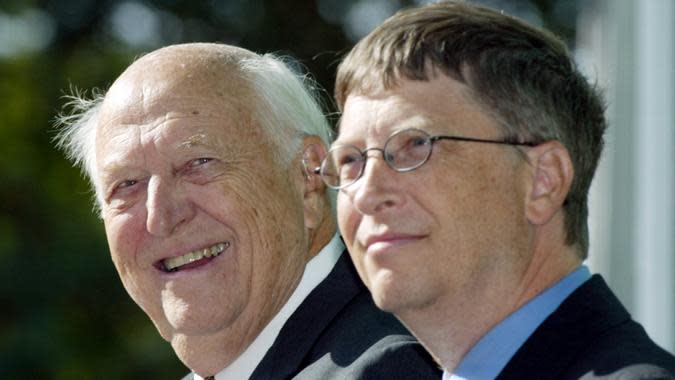
His Parents Were Supportive
When asked in 1998 about his role models, Gates said he looked up to his parents. Gates’ parents nurtured and supported his interest in computers as well — even after he decided to abandon his Harvard education. Gates’ father, Bill Gates Sr., told Forbes that his son’s decision to drop out of college “wasn’t precisely what my wife and I had envisioned for any of our children.”
However, Gates’ parents were extremely supportive of his endeavors after that. After Gates’ mother died in 1994, she helped her son “get the contract that led to a lucrative relationship with IBM for his fledgling Microsoft Corporation,” according to The New York Times.
As for his father, Gates long cited him as an inspiration for his philanthropic work, which has dominated the younger Gates’ time and energies since he left his day-to-day work at Microsoft in 2008. The elder Gates was actively involved in his son’s philanthropic work — he even wrote the first check for Gates’ foundation — until his death in 2020 at the age of 94.
Bill Gates is the father of three children — daughters Jennifer and Phoebe, born in 1996 and 2002, and son Rory, born in 1999. In interviews and speeches, he has given his ex-wife credit for 80% of the child rearing and said they followed the “love and logic” parenting method of the 1970s.
Discover: 6 Ways To Become Rich on an Average Salary

He Reads a Lot
In the Forbes interview, Gates’ father said his son was an incredibly avid reader as a child.
“Just about every kind of book interested him — encyclopedias, science fiction, you name it,” he said. “I was thrilled that my child was such an avid reader, but he read so much that Bill’s mother and I had to institute a rule: no books at the dinner table.”
That hasn’t changed. In 2021, in honor of World Book Day, he tweeted about his passion.
“I try to read every day, whether I have a busy day at the office or am out for a hike,” he wrote. “It’s one of my favorite ways to learn new things and better understand the world.”
Reading likely contributed to Gates’ net worth, as it helped provide him with the knowledge he would need to become a successful entrepreneur. He recommends books on his blog, GatesNotes.

He Chose a Great Business Partner
Gates has made countless brilliant business decisions, many of which have involved the people he has chosen to work with.
“I’d say my best business decisions really have to do with picking people,” Gates said in the 1998 interview. “Deciding to go into partnership with Paul Allen is probably at the top of the list.”
Allen and Gates were friends growing up, and they co-founded Microsoft in 1975. Allen left the company eight years later, after being diagnosed with Hodgkin’s disease. A fellow philanthropist who gave away more than $2 billion, Allen owned the NFL’s Seattle Seahawks and the NBA’s Portland Trail Blazers at the time of his death, at age 65, in 2018 from complications of non-Hodgkin’s lymphoma.
Throughout the years, Gates and Allen had a “complex relationship,” as outlined in Allen’s book, “Idea Man: A Memoir by the Cofounder of Microsoft.” However, Gates attributes Microsoft’s early success to his partnership with Allen and the many lessons they learned along the way.

He Has Remained Passionate About His Work
As many entrepreneurs have said, you must love what you do if you hope to be successful. Bill Gates fell in love with computers as a child and spent a lifetime building one of the most successful businesses in the world.
“You’ve got to enjoy what you do every day, and for me that’s working with very smart people,” Gates said in 1998. “It’s working on new problems. … The competition, the breakthroughs, the research make the field I’m in, I think, the most exciting field there is.”
Even though he left his day-to-day role at Microsoft more than a decade ago, Gates served as Microsoft’s chairman of the board. In 2020, however, he left the board to focus solely on his philanthropic work.
I’m a 27-Year-Old Hedge Fund Founder Managing Almost $1 Billion: Here’s Why I Prefer Alternative Investments to Stocks

He Stayed Confident in His Dream and Vision
Gates was fortunate to attend Lakeside School, an elite private school in Seattle that gave him access to computers when he was in the seventh grade. Instead of just teaching students how to use computers in the conventional sense, the school “unleashed” them, according to Gates. Looking back, he said his experiences at the school gave him the vision and encouragement he needed to do the impossible.
His vision continues today, though on a different front. His aim now is to better arm the world to fight the threat from future pandemics. The Gates Foundation, as of January 2022, had given more than $2 billion to vaccines and other efforts related to COVID-19.
Gates has written a book, “How to Prevent the Next Pandemic,” which is due for release on May 3, 2022.

He Had an Emergency Fund for Microsoft
Gates learned early that, in order to be successful, he had to amass a large emergency fund for Microsoft, which would keep the business afloat if it ever encountered financial obstacles.
“I always had to be careful that we wouldn’t hire too many people,” he said in a 2018 interview on “The Ellen DeGeneres Show.” “I was always worried because people who worked for me were older than me and had kids, and I always thought, ‘What if we don’t get paid? Will I be able to meet the payroll?'”

He Learned From His Mistakes With Microsoft
Everyone makes mistakes, including Gates. The key, however, is to learn from those errors, and that’s exactly what Gates has done.
At a 2019 Village Global event, Gates said his biggest mistake was not jumping into competition with Apple after it released its first iPhone in June 2007. Google did just that with its Android device in 2008.
“These are winner-takes-all markets. So the greatest mistake ever is whatever mismanagement I engaged in that caused Microsoft not to be what Android is,” he said. “That was a natural thing for Microsoft to win.”
See: Shark Tank’ Star Lori Greiner’s 5 Most Successful Retail Deals That Made Her a Millionaire

He Gets Seven Hours of Sleep
Although many successful businessmen like to brag about how little sleep they get, Gates is the opposite. He knows he’s not superhuman and that sleep is required for his intellectual curiosity to be at its best.
“I like to get seven hours of sleep,” he told The Seattle Times in 1990. “Even though it’s fun to stay up all night — maybe taking a red-eye flight — if I have to be creative, I need seven hours.”
He hasn’t changed his mind in the ensuing years. In a December 2019 post on his blog, he doubled down. “Does everyone really need seven or eight hours of sleep a night?” he pondered. “The answer is that you almost certainly do, even if you’ve convinced yourself otherwise. In the words of Dr. Thomas Roth, of the Henry Ford Hospital in Detroit, ‘The number of people who can survive on five hours of sleep or less without impairment, and rounded to a whole number, is zero.’
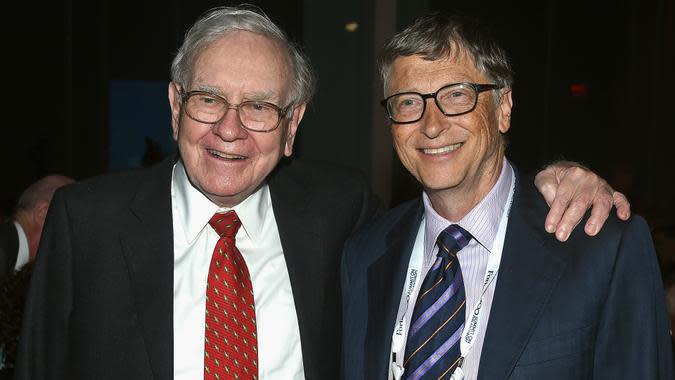
He Learns From Those Around Him
Gates and legendary entrepreneur Warren Buffett became friends 30 years ago when the two met over Fourth of July weekend in 1991 in Seattle by chance — not through business. Gates celebrated that friendship — and Buffett’s 90th birthday — in a blog post in 2020 and discussed one of the ways Buffett has influenced him.
“As Warren himself put it a few years ago when we spoke with some college students, ‘You will move in the direction of the people that you associate with. So it’s important to associate with people that are better than yourself,'” Gates wrote. “The friends you have will form you as you go through life. Make some good friends, keep them for the rest of your life, but have them be people that you admire as well as like.”
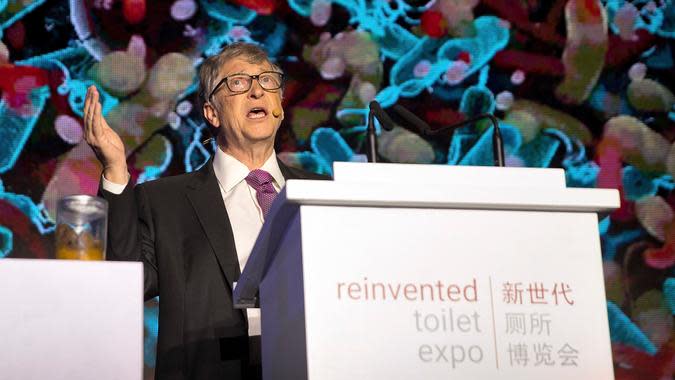
He Diversified His Private Portfolio
When Gates was building Microsoft, he put most of his time, energy and creative talent into making it arguably the greatest tech company in the world. Once he got rich, however, he did what most financial advisors recommend investors do regardless of their net worth: He diversified. At the time he stepped down from the Microsoft board in March 2020, he owned about 1% of the company’s stock, Forbes reported.
He then used the cash to invest in a wide range of stocks and other assets that protected his massive portfolio from a single-security calamity. Forbes said he holds stock in Canadian National Railway and AutoNation and that he is among the largest owners of American farmland. CNBC reported in April 2022 that he also is an investor in Motif FoodWorks, a plant-based food company.
I’m a Financial Advisor: Here Are 6 Things My Clients Don’t Like to Hear — and Why I Tell Them Anyway
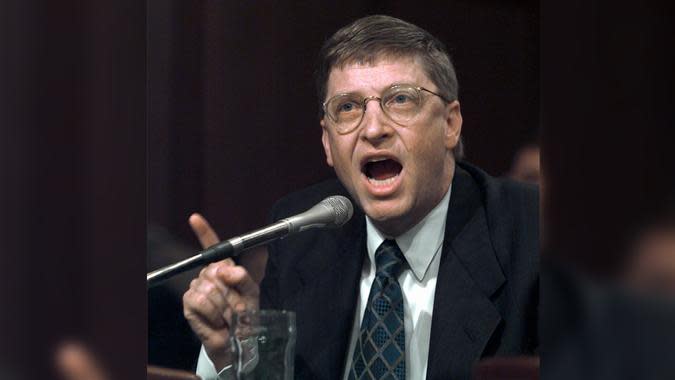
He Knew When He Had Outgrown Partnerships
Microsoft’s partnership with IBM formed the backbone of the 1980s personal computer revolution. The two companies collaborated to create the operating systems that breathed life into most PCs. By the early 1990s, however, the partnership had stagnated and Gates determined Microsoft would be better going it alone.
The gamble paid off.
When the separation was complete in 1992, IBM walked away with the jointly created OS/2 operating system and Microsoft left with the software that would make it king: MS-DOS and Windows. In 2016, Forbes wrote of Gates, “His decision to divorce IBM stands as one of his best. Microsoft took control over its own destiny.”

He Learned To Give Up Control
According to a 2019 report from Inc., Gates found success only after he learned to trust the people he hired and delegate responsibility to them. That, however, required Gates to do something that was antithetical to his entire personality: Forfeit control.
In Microsoft’s early years, Gates maintained a tight grasp on everything that happened and did whatever he could himself, but how could he grow Microsoft to its full potential if he spent all day writing or editing code? He couldn’t.
Instead, he developed relationships with key employees, and those relationships were based on mutual trust. He found that the new mentality allowed him to take on the role of mentor instead of micromanager, which, it turns out, suited him well.
This ability to be creative, work with his team and have a big enough cash cushion to continuously grow and try new things contributed greatly to Microsoft’s success and, eventually, Gates’ fortune.
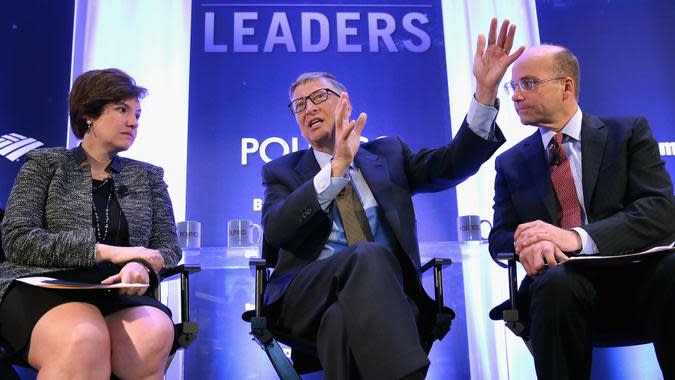
He Has Remained Passionate About His Work
As many entrepreneurs have said, you must love what you do if you hope to be successful. Bill Gates fell in love with computers as a child and spent a lifetime building one of the most successful businesses in the world.
“You’ve got to enjoy what you do every day, and for me that’s working with very smart people,” Gates said in 1998. “It’s working on new problems. … The competition, the breakthroughs, the research make the field I’m in, I think, the most exciting field there is.”
Even though he left his day-to-day role at Microsoft more than a decade ago, Gates served as Microsoft’s chairman of the board. In 2020, however, he left the board to focus solely on his philanthropic work. As the COVID-19 pandemic swept the world, Gates reinvented himself again by emerging as a leading advocate for science-based policy in government while donating hundreds of millions of dollars to coronavirus-related research and causes.
Andrew Lisa contributed to the reporting for this article.
More From GOBankingRates
This article originally appeared on GOBankingRates.com: 13 Habits That Helped Bill Gates Build His $110 Billion Fortune

 Yahoo Finance
Yahoo Finance 